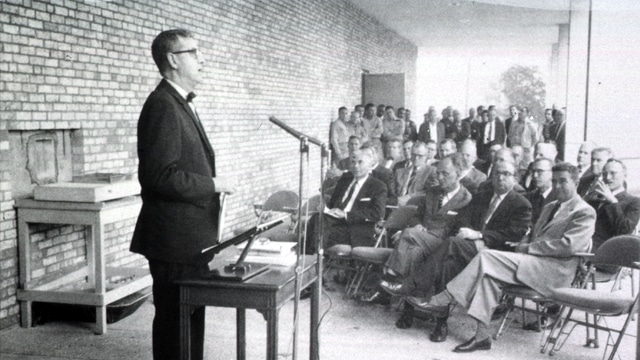March 29, 1985
Luther Leonidas Terry, born in Red Level in Covington County, served as U.S. surgeon general in the 1960s. Terry, who graduated from Birmingham-Southern College and earned his medical degree from Tulane University, was appointed by President John F. Kennedy to the post in 1961. Terry quit smoking in 1963 and made it his mission to urge millions of Americans also to quit. His 1964 surgeon general’s report on smoking and health conclusively determined that smoking was a deadly health hazard. His actions led to the warning labels on cigarette packages, which continue to this day. Terry, who died on this day in 1985, along with U.S. Sen. Lister Hill was one of the most influential Alabamians in improving public health during the 20th century.
Read more at Encyclopedia of Alabama.

Luther Terry (1911-1985) was the U.S. surgeon general from 1961-65. He campaigned to curb cigarette smoking in America and spearheaded the use of health warning labels on tobacco products. (From Encyclopedia of Alabama, courtesy of U.S. National Library of Science)

Luther Terry performing a cardiovascular examination, 1952. (The National Library of Medicine)

Prior to his appointment by President John F. Kennedy as surgeon general in 1961, Luther Terry held leading positions at the Public Health Service Hospital in Baltimore, Maryland, and at the Clinic of General Medicine and Experimental Therapeutics at the National Heart Institute (now the National Heart, Lung and Blood Institute). (From Encyclopedia of Alabama, courtesy of University of Alabama at Birmingham Archives)

Shortly after a committee in Britain issued a report on the dangers of tobacco use in 1962, Luther Terry formed the Surgeon General’s Advisory Committee on Smoking and Health, which in 1964 released “Smoking and Health: Report of the Advisory Committee to the Surgeon General of the United States,” the first U.S. report to declare smoking a health hazard. (From Encyclopedia of Alabama)

Surgeon General Luther Terry, U.S. Sens. Lister Hill, of Alabama, and Abraham Ribicoff, of Connecticut. (The National Library of Medicine)
For more on Alabama’s bicentennial, go to Alabama 200.











